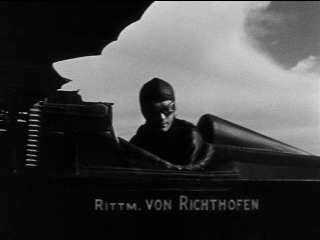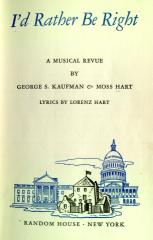Submitted by taoyue on Sun, 04/03/2005 - 16:00
Hell's Angels (1930)
directed by Howard Hughes, dialog directed by James Whale
©1930 Caddo Company, Renewed 1958 Hughes Tool Co.
Restored by the UCLA Film and Television Archive
Frames in this review are taken from the Universal DVD ©2004 Universal
Studios.
There's no trailer on the Universal DVD for Hell's Angels, but
it doesn’t matter. No trailer could possibly sell the film as well as
Martin Scorsese's biopic
The Aviator . Some of the most spectacular scenes in this film
are excerpted in The Aviator, most notably, the Zeppelin
bursting into flame in a lengthy hand-colorized shot, as well as the
dizzying climatic dogfight, featuring perfectly choreographed aerobatics
and a surprisingly believable head-on collision of two planes.
. Some of the most spectacular scenes in this film
are excerpted in The Aviator, most notably, the Zeppelin
bursting into flame in a lengthy hand-colorized shot, as well as the
dizzying climatic dogfight, featuring perfectly choreographed aerobatics
and a surprisingly believable head-on collision of two planes.

[...]
All in all, Hell's Angels is a rather enjoyable example of the
type of film spectacle that was extraordinarily expensive then and would
be prohibitively costly today. Were it not for the flying, the film
could've been shot in a couple of weeks for far less money. It's far
superior to most early-sound films, and with some allowance for the
melodramatic story, remains quite watchable today.
<
[...]
Submitted by taoyue on Sat, 03/05/2005 - 15:00
1421: The Year China Discovered America
by Gavin Menzies
Hardcover, US edition: New York: Morrow, 2003. ISBN 0-06-053763-9
Trade paperback, US edition, revised: New York: Perennial, 2004. ISBN 0-06-054094-X
[...]
Menzies, a retired Royal Navy submarine captain, claims that four separate Chinese fleets under the overall aegis of the great eunuch admiral Zheng He sailed on great voyages of discovery about the year 1421. During these voyages, they discovered the Americas, Antarctica, Oceania, various Pacific islands, and longitude — basically, every continent except Europe. The Zhu Di emperor's death, however, put an end to the great voyages of discovery. China turned her energies inwards, and records of the Zheng He voyages were destroyed. Within a century, though, Europeans picked up the mantle of discovery. These great explorers thus bravely set forth into the (not-quite) unknown, ultimately handing Europe the mantle of world dominance on the back of Chinese maps.
[...]
Submitted by taoyue on Fri, 02/11/2005 - 15:00
Brothel: Mustang Ranch and Its Women
by Alexa Albert
New York: Random House, 2001. ISBN 0-375-50331-5
Nevada is the only state in the Union in which prostitution is legal, and
as Alexa Albert makes clear in this book, the business of prostitution is
just as complicated as any other legal enterprise. It's a business with
many rules and regulations. Nevada state law allows local areas to
regulate prostitution, county laws place restrictions on it, individual
brothels have rules for customers and prostitutes, and each prostitute
also sets her own rules. Prostitutes in Nevada’s legal brothels pay
taxes like any other employee; one of them hired an accountant who mulled
the proper response for "Occupation" on her tax return. Licenses can be
procured at the local police station, and the brothel industry
association spokesman is George Flint, a retired minister who also owns a
wedding chapel business.
Albert first encountered the Nevada brothel industry when she was
studying public health in college, when she wrote a research paper [...]
Submitted by taoyue on Mon, 02/07/2005 - 15:00


I'd Rather Be Right
A Musical Revue
by George S. Kaufman & Moss Hart
Lyrics by Lorenz Hart
Hardcover: New York: Random House, 1937. 4 plates.
Well printed on acid-free paper, so should remain in good shape if
properly stored. Music composed and written by Richard Rodgers and Lorenz
Hart, separately published.
I first discovered this musical after watching James Cagney perform the
showstopper "Off the Record" song-and-dance routine in
Yankee Doodle Dandy . That biopic of songwriter and performer George M.
Cohan is a fabulous film, using Hollywood’s best showmanship to string a
bunch of songs together into a rousingly patriotic plot that was just the
ticket in 1942.
. That biopic of songwriter and performer George M.
Cohan is a fabulous film, using Hollywood’s best showmanship to string a
bunch of songs together into a rousingly patriotic plot that was just the
ticket in 1942.
[...]
Submitted by taoyue on Sun, 02/06/2005 - 15:00
Pillow Talk (1959)
directed by Michael Gordon
starring Rock Hudson, Doris Day, Tony Randall, and Thelma Ritter
Whenever a remake comes out, you can count on the original film being
placed on the DVD release schedule. And even though the deliberately
retro
Down with Love isn't a direct remake of Pillow Talk,
there are so many recycled elements that it might as well be. After all,
we’re not really watching for the plot, but for the 1960s atmosphere. In
2004 Universal quickly replaced the laserdisc-port 1999 DVD with a fresh
edition. Pillow Talk in widescreen is almost a poster child for
letterboxing, with its expansive sets, the rear-projection scenes of the
main characters sitting in cars, and of course, the his-and-her split
screens of phone conversations (sometimes split three ways).
isn't a direct remake of Pillow Talk,
there are so many recycled elements that it might as well be. After all,
we’re not really watching for the plot, but for the 1960s atmosphere. In
2004 Universal quickly replaced the laserdisc-port 1999 DVD with a fresh
edition. Pillow Talk in widescreen is almost a poster child for
letterboxing, with its expansive sets, the rear-projection scenes of the
main characters sitting in cars, and of course, the his-and-her split
screens of phone conversations (sometimes split three ways).
Those phone conversations launch the plot, as the premise for the comedy
is that songwriter and playboy Brad Allen (Rock Hudson) shares a party
line with interior decorator Jan Morrow (Doris Day). He's constantly
hogging the line, crooning the same old love song to different women in
English and French. Doris Day kept playing pure virginal characters, and
romance isn’t on her character’s mind this time either. She’s happily
single and resisting advances from her clients, but she is quite annoyed
that she never gets to use the phone line. When the two parties get on
the line simultaneously, Allen attributes her party-crashing phone
interruptions to her "bedroom problems." She then happily redecorates
her bedroom.
[...]
Submitted by taoyue on Sun, 02/06/2005 - 15:00
The Perfect Store: Inside eBay
by Adam Cohen
Hardcover: Boston: Little Brown, 2002. ISBN 0-316-15048-7
"When the early history of the Web is contemplated centuries hence,
Adam Cohen's detailed and thorough account of the founding and
development of eBay will be among the books that people will turn to to
truly understand one of the Internet's most important companies."
— Kara Swisher, Wall Street Journal columnist, as quoted on
the back cover
Adam Cohen has written a very thorough company account, one that takes
into account many diverse viewpoints. Cohen is on the editorial board of
The New York Times, and each section in the book seems to
follows the inverted pyramid style of journalism. There’s an
eye-catching lead to pique the reader's interest, some background, quotes
from sources, and finally, an analysis of the topic’s significance. One
could imagine this book having been compiled from several articles in the
Times.
[...]
Submitted by taoyue on Sun, 02/06/2005 - 15:00
Frau im Mond (1929)
(Woman in the Moon)
directed by Fritz Lang
Frames in this review are taken from the Kino DVD which is © 1929 Friedrich
Wilhelm Murnau Stiftung, renewed by Notice of Intent to enforce a Copyright
1996 under the Uruguay Round Agreement Act by the
Friedrich-Wilhelm-Murnau-Stiftung successor of UFA, English Translation ©
2004 Kino International Corp, Licensed from Transit Films GMBH on behalf of
the F. W. Murnau Foundation, Wiesbaden
To catch misspellings in web searches: Frau im Monde
[...]
Watching Woman in the Moon will send shivers up the
spine of the space enthusiast. The science depicted in the film has an
impressive pedigree — the technical sections are attributed to Dr.
Hermann Oberth, the father of German rocketry and mentor of Dr. Werner
von Braun, creator of the V-2 ballistic missile and later head of the
Saturn rocket program.
[...]
Submitted by taoyue on Fri, 12/31/2004 - 15:00
Spycatcher: The Candid Autobiography of a Senior Intelligence Officer
by Peter Wright, Former Assistant Director of MI5, with Paul Greengrass
Hardcover: New York, Viking Penguin, 1987. ISBN 0-670-82055-5
From the jacket:
“Uncensored, remarkably candid, and enormously revealing about the real spy business that most of us know principally from fiction ... as Britain's principal liaison with American intelligence officials ... Wright's insights about the CIA and the FBI ... is riveting stuff ...American interest ought to be especially aroused by Peter Wright's charge that there was a conspiracy within MI5 to overthrow then Prime Minister Harold Wilson in the mid-1970s, and that it was instigated from within the CIA ... But the most important aspect of this book is that it offers a rare inside glimpse of the real day-by-day goings-on within the intelligence world over a long period of time from a very high-level, authoritative voice.”
[...]
The heart of the book is on Wright's work in counterintelligence. As operations kept going wrong, and pieces of the puzzle began to fit together, Wright focuses on Roger Hollins as a suspected Soviet agent. He would be the Fifth Man, the only man remaining at-large from a busted five-person Soviet spy ring that had placed men at high levels of British government. But since Hollis was the Director of MI5, Wright was never able to prove his allegation. The identity of the Fifth Man remains unknown today. In the world of double-agents and barium meals (disinformation), colleagues turn out to be enemies, enemies turn out to be friends (most notably in the CIA), and the truth only becomes murkier once the subject goes to the grave.
[...]
Submitted by taoyue on Tue, 12/14/2004 - 15:00
Sailing Through China
by Paul Theroux
Boston: Houghton Mifflin, 1984
Paul Theroux has authored dozens of travelogues, many of which have made
The New York Times bestseller list. He has traveled extensively
by rail on all continents, including lines in Africa and South America
that have long since fallen victim to civil wars or economic downturns.
These are journeys that you can now experience only through travelogues
from decades past.
[...]
Submitted by taoyue on Sun, 12/05/2004 - 15:00
The article below appeared in the February 1924 issue of
The
American Magazine, a mass-circulation magazine that
transmitted the popular culture of the day to the households of
America. The magazine boasted on its cover “More than 2,000,000
Circulation,” — quite impressive for a nation whose
population numbered 106 million, as of the 1920 census. Although it
is attributed to an anonymous author, “Why I Never Hire
Brilliant Men” was the cover story for that issue. In the
practice of the day, however, the cover illustration was completely
unrelated to the cover article. (The New Yorker, one of the
few surviving magazines from that era, still carries on this
tradition).
The article explains all the faults that the author found endemic among
brilliant men. They start well but never finish, they get excited over
revolutionary developments but grow weary of repetitive small tasks.
This was so exasperating to the author that, after experiencing several
such brilliant men in his business, he decides that he’s better off not
hiring them. Full of pithy quotes and life lessons learned from
individual experiences, the article reads almost like a modern-day issue
of Reader's Digest, with its prescriptions of hard work and
[...]
Pages